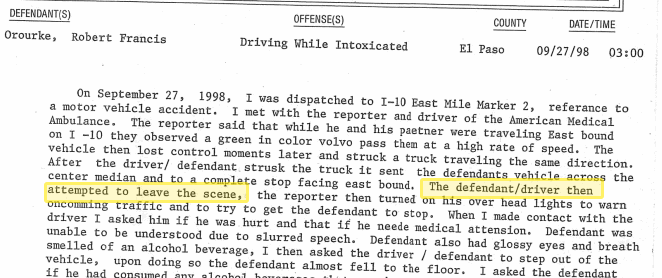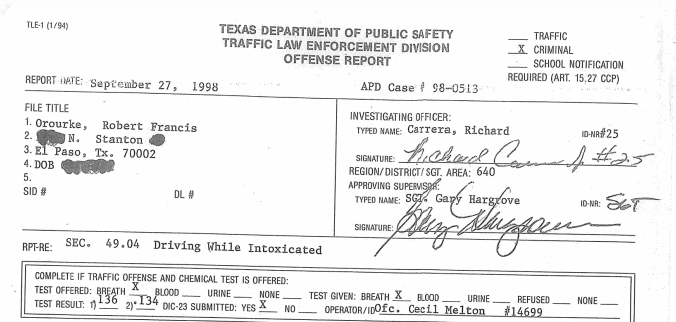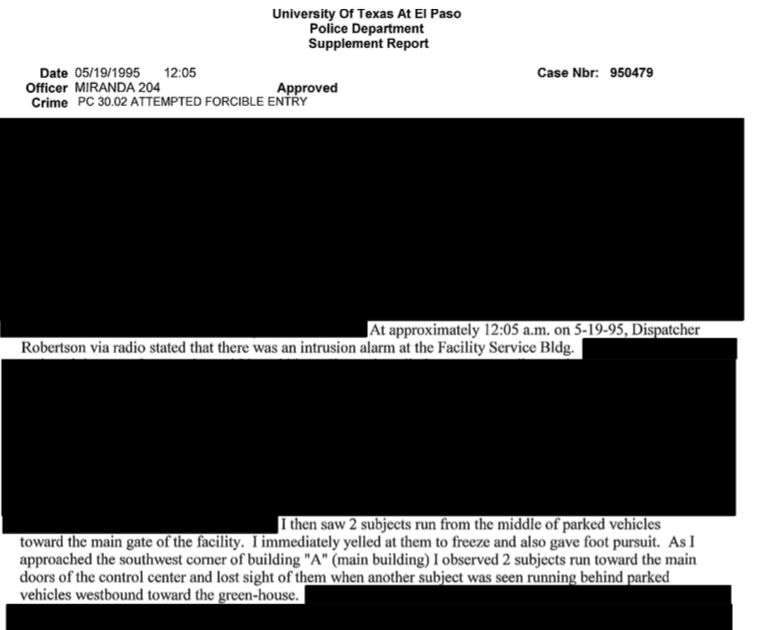
Officers At Scene Of Beto O’Rourke’s 1998 DWI Crash Say They Believe He Tried To Flee
Until now, O’Rourke, who denies trying to flee the wreck, was the only person present at the scene of the collision to speak out publicly about what happened that night. “I believe we have contradicting stories here,” says the officer who arrested him.
By Jay Root
The former police officer who arrested Beto O’Rourke for driving drunk in 1998, along with the sergeant who signed the incident report, both say they believe now what they reported at the time: that O’Rourke tried to leave the scene of the wreck he caused.
O’Rourke admits he was intoxicated and says there is no justification for his actions, but he has denied that he tried to flee.
“Beto’s DWI is something he has long publicly and openly addressed over the last 20 years at town halls, on the debate stage, during interviews and in Op-Eds, calling it a serious mistake for which there is no excuse,” said O’Rourke spokesman Chris Evans. “This has been widely and repeatedly reported on.”
Neither the investigating officer, Richard Carrera, nor his former supervisor, Gary Hargrove, specifically recalls the events of that night more than 20 years ago. But both of the former Anthony Police Department officers told The Texas Tribune they have no doubt the report they compiled and signed is accurate.
“I believe we have contradicting stories here,” said Carrera, who arrested the 26-year-old O’Rourke and took him to a police station to undergo a breath test. “I stand by my report.”
Carrera, 49, said after reading the police report, in which an unnamed witness claimed O’Rourke tried to flee in his Volvo, he has “no doubt that he tried to leave the scene.”

Hargrove, 71, oversaw the crash scene but does not remember being there. However, he said he believes what his officers told him about the two-vehicle collision that occurred in Anthony, a tiny town near the Texas-New Mexico border west of El Paso.
Hargrove said the report, which he reread after the Houston Chronicle published it last year, shows O’Rourke “struck the [other] car from the rear and he ended up in the median pointed the wrong way, and he took that as his chance to get away.”
“He did something to lead the officers to believe that he was trying to get away,” Hargrove said. “What they put down, I believed them.”
Until now, O’Rourke was the only person present at the scene of the wreck to speak out publicly about what happened that night. O’Rourke told Vanity Fair he had been drinking in El Paso — Jameson whiskey with his father, the former county judge of El Paso County — and later with a high school friend. He was taking his date, identified only as Michelle in the article, back home to Las Cruces, New Mexico, when the crash occurred.
During last year’s Texas Tribune Festival, O’Rourke said he reached out to the woman for the first time in more than 15 years and asked her recollection of that evening — and he told Tribune CEO Evan Smith during an onstage interview that she had the same recollection he did.
“She said, ‘No, we were in the median of the road. We did not try to flee. I don’t know that there was anywhere we could have gone,’” he said. The Tribune has requested an interview with the woman through the O’Rourke campaign.
Evans, the O’Rourke spokesman, noted that “the police report shows he was arrested for a DWI not for leaving or attempting to leave the scene.”
Carrera could not recall if there were any discussions about bringing charges against O’Rourke for attempting to flee the scene.
An Army veteran who served in Iraq in 2009 and now works for the federal prison system as a drug treatment specialist, Carrera said he’s not political and probably won’t vote in the 2020 elections. Hargrove, who retired after more than four decades in law enforcement, identified himself as a Republican.
In the 12-page incident report from Sept. 27, 1998, Carrera wrote that he was dispatched at about 3 a.m. to Interstate 10 near the New Mexico line in “reference to a motor vehicle accident.”
REFERENCE
- Read the full DWI arrest report here.(4.4 MB) DOWNLOAD
When Carrera arrived at the scene, a witness who is not identified in the report told him that he saw O’Rourke’s Volvo heading west toward New Mexico “at a high rate of speed.” The report says the witness was also traveling west and saw the collision occur.
O’Rourke’s vehicle “then lost control moments later and struck a truck traveling in the same direction,” it says. After the wreck, O’Rourke’s vehicle crossed the center median and came to a stop facing the other way — pointing east toward El Paso.
“The defendant/driver then attempted to leave the scene,” Carrera wrote, and the witness “turned on his over head lights to warn oncoming traffic and to try to get the defendant to stop.”
According to the report, when Carrera asked O’Rourke if he was injured, the officer couldn’t understand what he answered “due to slurred speech.” Seeing O’Rourke’s “glossy eyes” and smelling alcohol on his breath, Carrera asked him to exit the vehicle, and he “almost fell to the floor,” Carrera wrote.
Carrera arrested O’Rourke and took him to a police substation, where breathalyzer administrator Cecil Melton, also a former officer with the Anthony Police Department, interviewed the future congressman and presidential contender.
O’Rourke, who had turned 26 the night before, told Melton he was en route to Las Cruces when the wreck happened and claimed he’d only had two beers. But when Melton gave him the breathalyzer test, O’Rourke blew a .136 and a .134 blood alcohol level, well past the legal limit at the time of .10 (The legal limit is now .08).
Melton, now a paramedic in El Paso, said he was doing multiple breathalyzer tests per week back then and has no recollection of O’Rourke.

One thing that could potentially help clarify matters is the accident report that Hargrove says he would have compiled and, as rules at the time required, copied and forwarded to the Texas Department of Public Safety. That report, separate from the DWI arrest report, would typically have a sketch of the crash scene and should contain the witness name and affidavit, Hargrove said.
ut current Anthony Police Chief Carlos Enriquez said a thorough search of department files turned up only the DWI report and accompanying breathalyzer analysis. Hargrove said typically all the reports would be in the same physical file they used back then, so what happened to the accident report remains a mystery.
The Texas Department of Public Safety, citing the expiration of the retention period for such old files, said it could not find the accident report, either.
It wasn’t the first time O’Rourke was accused of attempting to flee the scene of an alleged crime. According to a heavily redacted narrative of his May 1995 burglary arrest by the University of Texas at El Paso Police Department, O’Rourke and two associates allegedly broke into the yard of the facilities management building at the school, triggering an alarm.
One of the officers who responded to the scene said he saw “three subjects in the middle of the compound running in three different directions.”
REFERENCE
- Read the full burglary arrest report here.(91.2 KB) DOWNLOAD
“I immediately yelled at them to freeze and also gave foot pursuit,” the report says. “I observed two subjects run toward the main doors of the control center and lost sight of them when another subject was seen running behind parked vehicles westbound toward the green-house.”
The charges against all three were later dropped.

The El Paso district attorney then and now, Jaime Esparza, says he has no recollection of the burglary case and his office could not locate any files on it.
Nor could he recall the specifics of O’Rourke’s DWI, which his office oversaw. But Esparza, elected in 1992, said it was handled like any other first-offense DWI.
O’Rourke’s driver’s license was temporarily suspended and, under a pretrial diversion program that lasted about seven months, the misdemeanor drunken driving charges were dismissed after O’Rourke took traffic safety and alcohol abuse classes and agreed to stay sober and out of trouble while in the program.
O’Rourke waived his right to an attorney and represented himself, records show.
“We’re pretty liberal when it comes to pretrial diversion,” Esparza said. “He took his punishment and it was done.”
[divide icon_position=”left” width=”short” color=”#”]This story originally published by the Texas Tribune.






